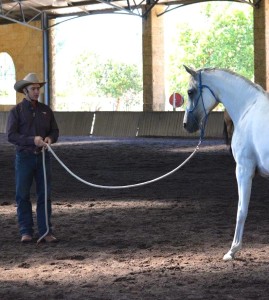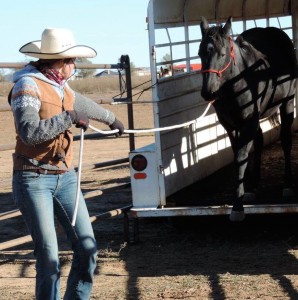 As owners and riders, we have the privilege of teaching our horses lots of nifty movements and exercises. We can do it with force and intimidation, with treats and sweets, or with the concept of partnership in which horses will:
As owners and riders, we have the privilege of teaching our horses lots of nifty movements and exercises. We can do it with force and intimidation, with treats and sweets, or with the concept of partnership in which horses will:
- appreciate a relationship of trust and dependability
- consistently be shown where and how to find comfort and relaxation
- learn that being with you is better than not being with you.
It’s not unlike raising a child. There are lots of ways to do it, but if you teach positively and with these things in mind, you’re more likely to end up with a resourceful, cooperative, independent thinker who has good manners.
Subscribe to our free weekly newsletter.
In two videos on “Head Down” cues, horseman Warwick Schiller dedicates several minutes to nuances of this specific horse work. Schiller, who has racked up more than eight million views on over 300 videos, warns of teaching and using ‘head down’ cues when the horse is otherwise worried or anxious.
“It’s not that I don’t like the cue. But I see a lot of people using it inappropriately,” said the Australian who’s based in central California. “An uptight horse with its head down is still an uptight horse. If you can do things to get rid of the anxiety, he will relax and put his head down.”
 Riders mustn’t mistake obedience for relaxation.
Riders mustn’t mistake obedience for relaxation.
Riders should nurture and guide the horse’s discovery of relaxation.
“There’s nothing wrong with responding to pressure, but the horse shouldn’t be worried when he’s doing it,” he added.
Amy Skinner discussed this training idea in her article on Ground Tying:
“People who work at keeping their horses confident, interested, and relaxed often find the benefits will show when they need their horses to be still and with them,” she explained.
“You’d like your horse to be happier to be with you than elsewhere. These horses will stay with their people because of the many hours spent working toward mutual respect, understanding, and confidence-building. …I don’t consider my horses to be “well behaved.” I’m not really interested in teaching behaviors. What I want is a horse whose behaviors are naturally occurring by his own choice. He is with me not because I trained him to be, but because he’s more comfortable there than anywhere else.”
that is so true i is cool to hang out with your horse and respect from both parties matter when out and about,
how ever i think we all need to be reminded now and then!!
thank you regards Johanna
Brilliant article. Hopefully lots of people will share this .
Hi I’ve got a 8yr old Tobiano, he’s a lovely boy, very willing to learn, and he never forgets anything , he’s not very street or worldly wise. He’s led a very sheltered life. But he is so genuine and puts his trust in me. So I have to be very careful not to change things , meaning I have to get it right first time . My only problem is he does not like putting the bit in his mouth, he puts his head up , but not in a nasty way, when I try to put his bridle on he will open his mouth eventually , normally takes about 2/3 mins. I’ve had his teeth done and we have no probs when I’m riding him. So do you have any tops or ideas what it could be and what to do to get it sorted . I’ve had him for 1yr and he’s been like that since then. I’m thinking that he might have been hurt in the past, Thank you